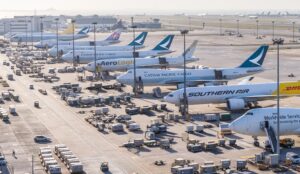Oct 30, 2023

Connected with over 220 destinations worldwide that are served by some 120 airlines, Hong Kong International Airport (HKIA) has secured its status as one of the top international hubs in the world.It has long been the busiest cargo airport in the world, handling a total of 4.2 million tonnes of cargo during 2022, according to the latest data released by Airports Council International.
With technology transforming the air cargo industry and the emergence of e-commerce and disruptive technologies, it seemed only natural for HKIA to embrace digitalisation.
“To cope with the increasing customer demand in this fast changing world while assuring high security and regulatory standards as well as operations efficiency, go-digital is the norm for all industries, with no exception for air cargo and logistics supply chain,” Irene Lau, Assistant General Manager, Aviation Logistics, Airport Authority Hong Kong said.
READ: Cathay welcomes initiatives to further strengthen Hong Kong’s aviation status
A synchronised sector
To stay ahead of the digitalisation curve and to continue reinforcing HKIA’s status in the airfreight sector, Airport Authority Hong Kong (AAHK) has developed a community-based digital platform, HKIA Cargo Data Platform, to connect supply chain stakeholders together. This move has helped to unleash the benefits of digitalisation provides for the air cargo and logistics industry in Hong Kong. HKIA Cargo Data Platform is built on smart technologies including blockchain, smart contracts and mobility solutions and is IATA One Record compliant.
“Leveraging a synchronised and trusted network, connecting our key air cargo stakeholders together, has ensured operational processes are streamlined and automated with seamless communication and better cargo journey visibility,” Irene explained.
The system’s first application release launched in October 2021, covering the pre-declaration process for export cargo, and so far, more than 300 entities have joined up. To cope with different processing needs, technology maturities and roles, the platform allows direct portal/mobile access and system integration.
HKIA Cargo GBA Sea-Air Transshipment Facilitation Scheme, the second application release, was launched in January 2022. This is a monitoring application offering Hong Kong Customs a one-stop integrated portal to access the orders, sea transport journey and security information on sea-air intermodal shipments that transit between HKIA Dongguan Logistics Park and HKIA.
The system was extended further in August 2023, with the release of HKIA’s third application, covering the upstream air cargo operations digitalisation in HKIA Dongguan Logistics Park. The first Chinese platform built to support sea-air intermodal shipment handling in the Greater Bay Area, it works to improve security screening, cargo consolidation and cargo terminal acceptance process.
Projects in partnership
Driving digitalisation requires concerted efforts from the entire supply chain stakeholders.
“Securing community support and change management are key success factors,” Irene highlighted. “Streamlining services requires breaking the silos, enabling collaboration in the supply chain and connecting partners together seamlessly.”
HKIA’s digital transformation project started with the early engagement of the community through industry groups and advisory groups, seeking their views and input on industry challenges and pain points.
“Involvement of key industry participants and business partners is essential and we invited pilot users from different roles and across various scales,” Irene stated.
“Identifying like-minded companies to work with, HKIA embraced a policy of driving public awareness, acceptance and adoption to encourage others to recognise the benefits of digitalisation.”
READ: Asia’s global gateway grows
Strategy to stay ahead
Data and technological transformation are key pillars in the digitalisation of the air cargo industry, amid growing trends, such as AI, robotics, automation and more.
HKIA aims to be a trend-setter in pioneering the development of a blockchain based community platform to drive not only process efficiency and standards but also work as a strategic enabler to drive air traffic and global trade as a world leading smart aviation hub.
“In parallel to developing the local ecosystem network through different application releases, we are also working actively with different industry stakeholders and platforms to identify potential areas for collaboration,” Irene said.
Looking beyond the airfreight community, HKIA has recognised that digital processes need to be adopted across the whole supply chain, from local players to global stakeholders to boost value and opportunities.
“We keep abreast of the latest industry trends and market landscape through which the challenges will be evaluated from different digital perspectives,” Irene added. “Through our ecosystem engagement and collaborations, innovative ideas and co-created initiatives are formulated. This enhances our competitiveness to stay ahead in the ever-evolving landscape of digitalisation in the airfreight industry.”
The post Building a platform for progress appeared first on AIR CARGO WEEK.
Go to Source
Author: Edward Hardy




